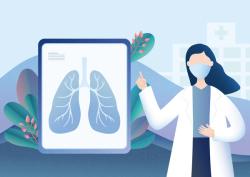Efti (eftilagimod alpha) plus Keytruda (pembrolizumab) with chemotherapy achieved high response rates in the first-line treatment of patients with advanced or metastatic non-squamous non-small cell lung cancer (NSCLC), according to a news release from Immutep.
Results were derived from the investigator-initiated INSIGHT-003 trial with a data-cutoff date of May 6, 2025.
Among all participants observed (51 patients), the overall response rate (ORR) was 60.8% and the disease control rate (DCR) was 90.2%. In patients with PD-L1 tumor proportion scores (TPS) under 1% (22 patients), the ORR was 54.5% and the DCR was 86.4%. Those with TPS between 1% and 49% (25 patients) had an ORR of 64% and a DCR of 92%. Patients with TPS under 50% (47 patients) showed an ORR of 59.6% and a DCR of 89.4%. The highest rates were seen in the small subgroup with TPS of 50% or higher (4 patients), with an ORR of 75% and a DCR of 100%.
Of note, approximately 92% of all patients in the study have a PD-L1 TPS of less than 50%, according to the news release.
“Our level of confidence in Efti driving a new standard of care for patients with non–small cell lung cancer via our pivotal TACTI-004 trial continues to rise with the strength of the data from INSIGHT-003 and TACTI-002,” Marc Voigt, CEO of Immutep, stated in the news release. “Across two trials we have now efficacy data from 165 patients with first-line NSCLC who have been treated with Efti and Keytruda, either with or without chemotherapy. In multi-national settings, efti has generated consistent and remarkable improvements in response rates. In particular, the interim ORR data in patients with PD-L1 expression below 50% in the ongoing INSIGHT-003 trial, who represent over two-thirds of the first-line NSCLC patient population, is very encouraging.”
Safety continues to be favorable for the combination in patients with first-line NSCLC with no new safety signals.
Comparing Results With Historical Control Registrational Trials
Patients with first-line NSCLC showed an improved ORR across all levels of PD-L1 expression compared with a historical control from a prior registrational trial of anti–PD-1 therapy plus chemotherapy.
Among patients with high PD-L1 expression (TPS greater than 50%), the ORR was 75% compared with 62.1% in the historical control. Those with low PD-L1 expression (TPS 1% to 49%) had an ORR of 64% versus 49.2%, while patients whose tumors had no PD-L1 expression (TPS less than 1%) saw an ORR of 54.5% versus 32.3%.
The 60.8% response rate across all PD-L1 levels marks a clear improvement over the 48% historical rate, despite fewer patients with high PD-L1 expression, according to the release. Among patients with PD-L1 below 50% — a group with high unmet need — the response rate was 59.6% versus 40.8% historically.
About the Trial, Efti and Presentation of Results
Conducted by the Frankfurt Institute of Clinical Cancer Research and other centers in Germany, the INSIGHT-003 trial is led by Dr. Salah-Eddin Al-Batran and represents a third treatment arm of the ongoing phase 1 INSIGHT trial.
Al-Batran is the director of the University Cancer Center Frankfurt at Krankenhaus Nordwest.
The regimen includes the experimental immunotherapy Efti, given by injection, alongside standard intravenous treatments: the anti-PD-1 drug Keytruda and the chemotherapy drugs carboplatin and pemetrexed. Researchers are assessing how safe and tolerable the combination is and whether it shows early signs of effectiveness.
Efti is designed to activate the body’s immune system by targeting antigen-presenting cells. It stimulates several key immune cells and helps increase the production of molecules that support immune response.
Additional updates from this study are expected at medical meetings in 2025 and beyond.
For more news on cancer updates, research and education, don’t forget to subscribe to CURE®’s newsletters here.




